Anti-government protests return to Hong Kong on Labour Day as police pepper spray crowd
- Officers deploy pepper spray to disperse people staging a singalong at New Town Plaza in Sha Tin after a day of mostly peaceful Labour Day events
- After denying permission for the traditional workers’ rights march, police visit union booths across the city and enforce social-distancing rules
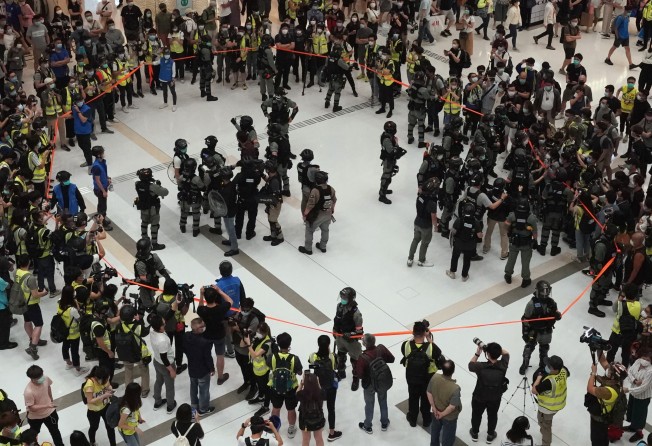
Hong Kong faced a resurgence of anti-government protests on the back of an improving coronavirus situation, with a return to riot police pepper spraying demonstrators to disperse them in a shopping mall at the end of a largely peaceful Labour Day.
An expected return to larger protest chaos on the streets did not materialise on Friday, and officers who had fanned out across the city only had to contend with small groups and individuals to enforce a ban against public gatherings.
But it was a stark reminder of the political and social turmoil waiting in the wings, interrupted only by the Covid-19 pandemic, after last year’s mass protests and street violence.
Protesters began to gather at the atrium of New Town Plaza in Sha Tin at around 7pm on Friday, singing Glory to Hong Kong, the anthem of the anti-government movement.
Police initially pushed them away and cordoned off the area, including upper floors overlooking the space, warning they were violating the new law limiting public gatherings to groups of four.
Protesters chanted “Liberate Hong Kong, revolution of our times” as they retreated. Officers used pepper spray to disperse the crowd after small confrontations with protesters. Journalists caught up in the chaos were hit.
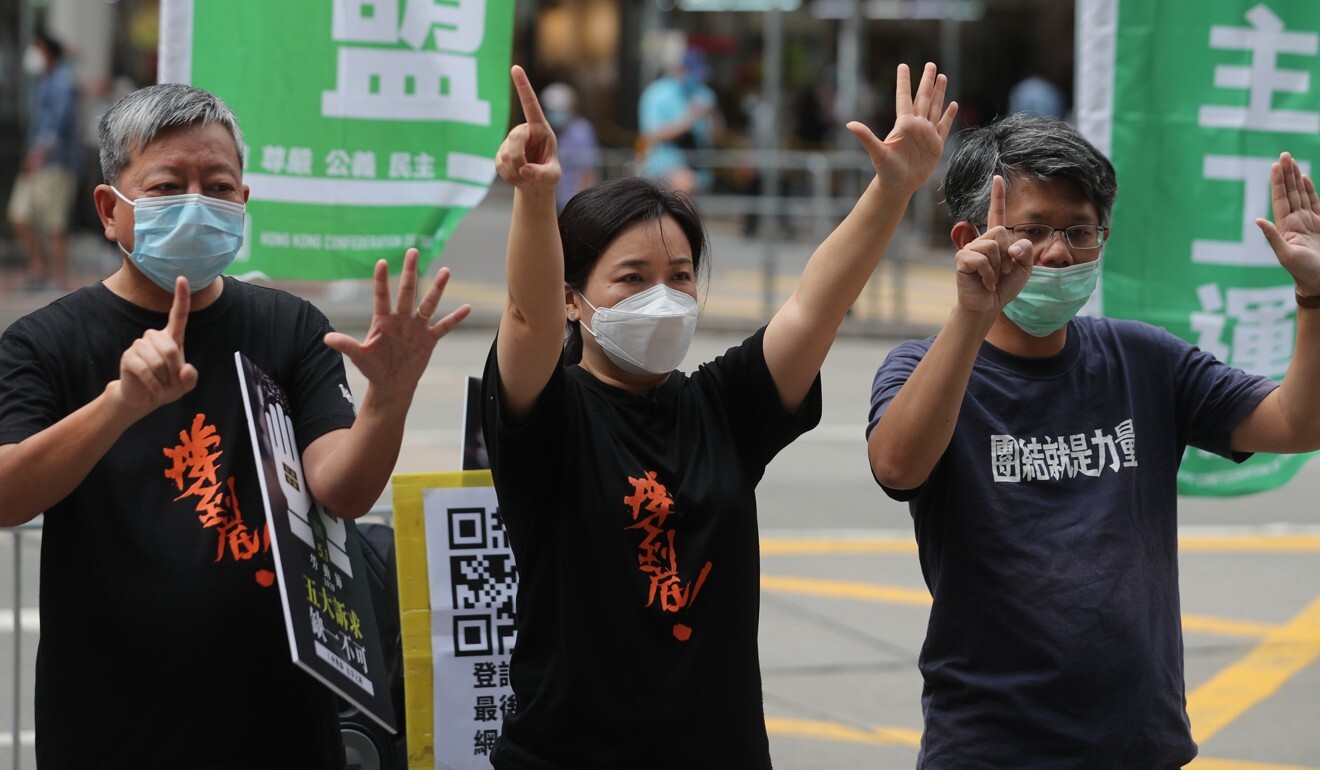
Police were out in force across the city, prompted by messages circulating online this week urging protesters to join flash mobs in Mong Kok, Causeway Bay, Sai Ying Pun, Tai Po and Kwun Tong on Friday afternoon, with a singing protest in New Town Plaza in Sha Tin to follow in the evening.
The appeal for flash mobs came after police denied unions permission to stage their traditional Labour Day rallies, citing risks to public health. As an alternative, the opposition Confederation of Trade Unions (CTU) planned to set up more than 50 street booths around the city to promote workers’ rights.
At a booth in Mong Kok, CTU chairwoman Carol Ng Man-yee said the months of protests and the pandemic had highlighted the government’s shortcomings. “The government’s anti-epidemic fund ignored the needs of the unemployed and freelancers ... The social movement and the pandemic show that this is not an administration for the Hong Kong people,” Ng said.
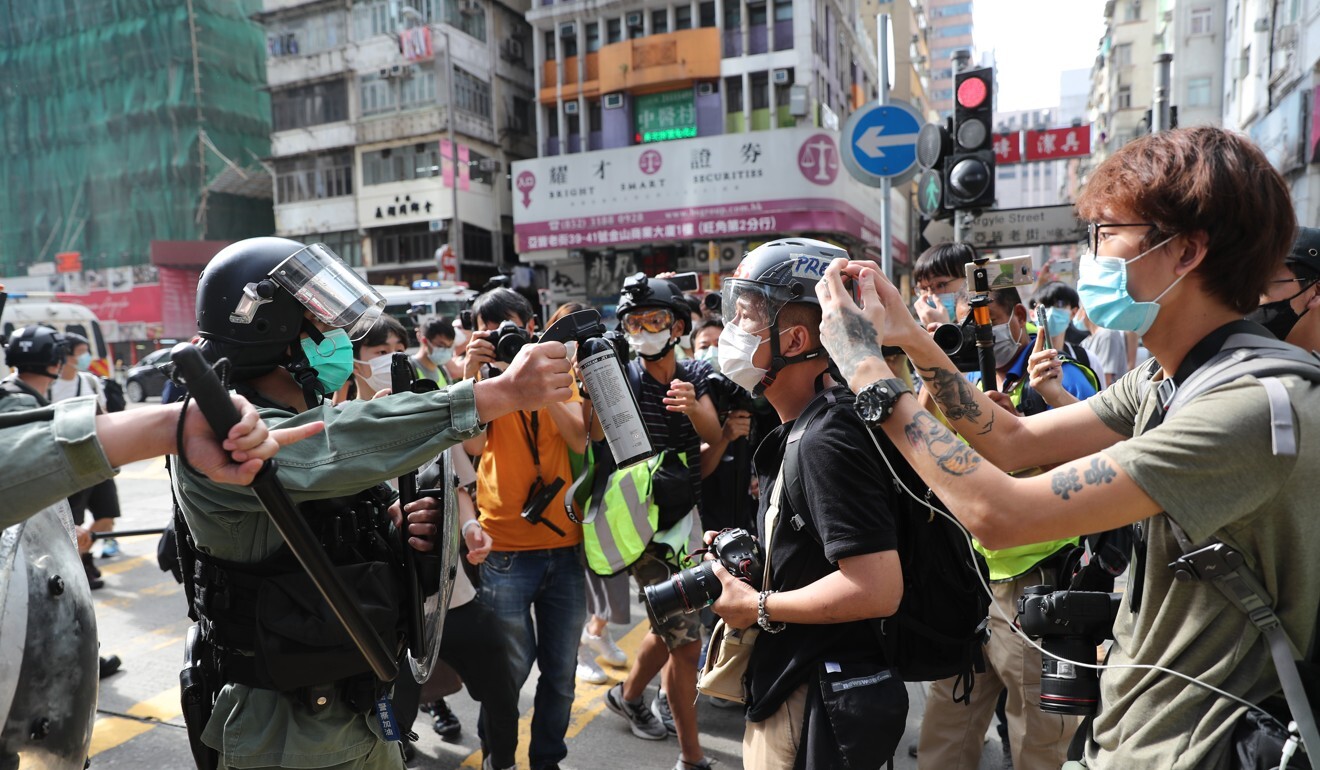
She urged residents to join or establish unions, as labour groups had played a key role in the protests which began in June against the government’s now-withdrawn extradition bill. She also called for support for shops sympathetic to the protest movement.
But shortly after Ng spoke, an argument erupted among residents in the street. Riot police arrived and cordoned off an entrance to Langham Place. Reporters were kept away with pepper spray warnings.
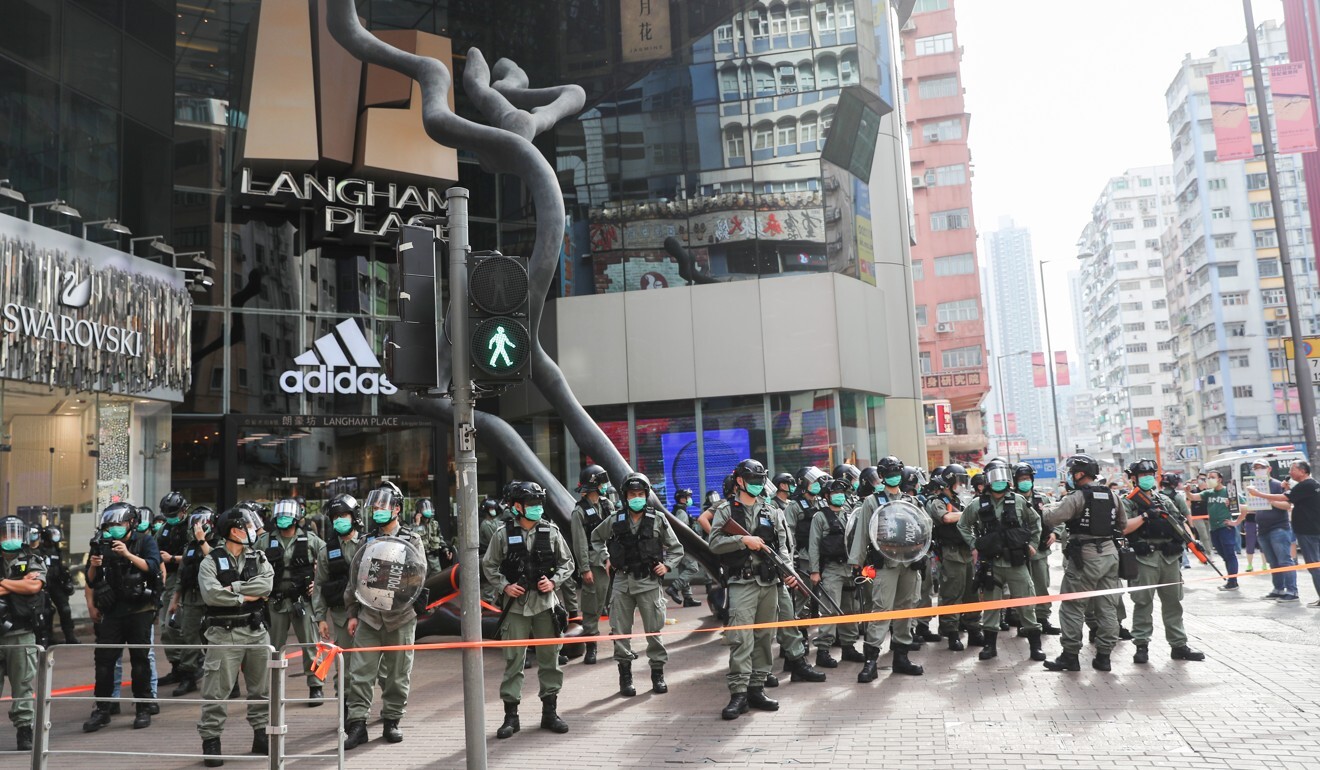
At 5.01pm, the time representing the date, unionists including former lawmaker Lee Cheuk-yan who had gathered in Mong Kok raised their arms, with one hand showing five fingers and the other a single one, and chanted “Five demands, not one less”. The refrain is the rallying cry of the movement, and among the demands are an independent inquiry into police use of force and the implementation of universal suffrage.
Dozens of people nearby repeated the phrase, including a 70-year-old retiree who said she came out to keep the momentum of the movement going. She brushed off fears about contracting the coronavirus, saying the pandemic had eased and she always wore a mask.
“A lot of students have been arrested. If we old people don’t come out, the movement will end,” she said.
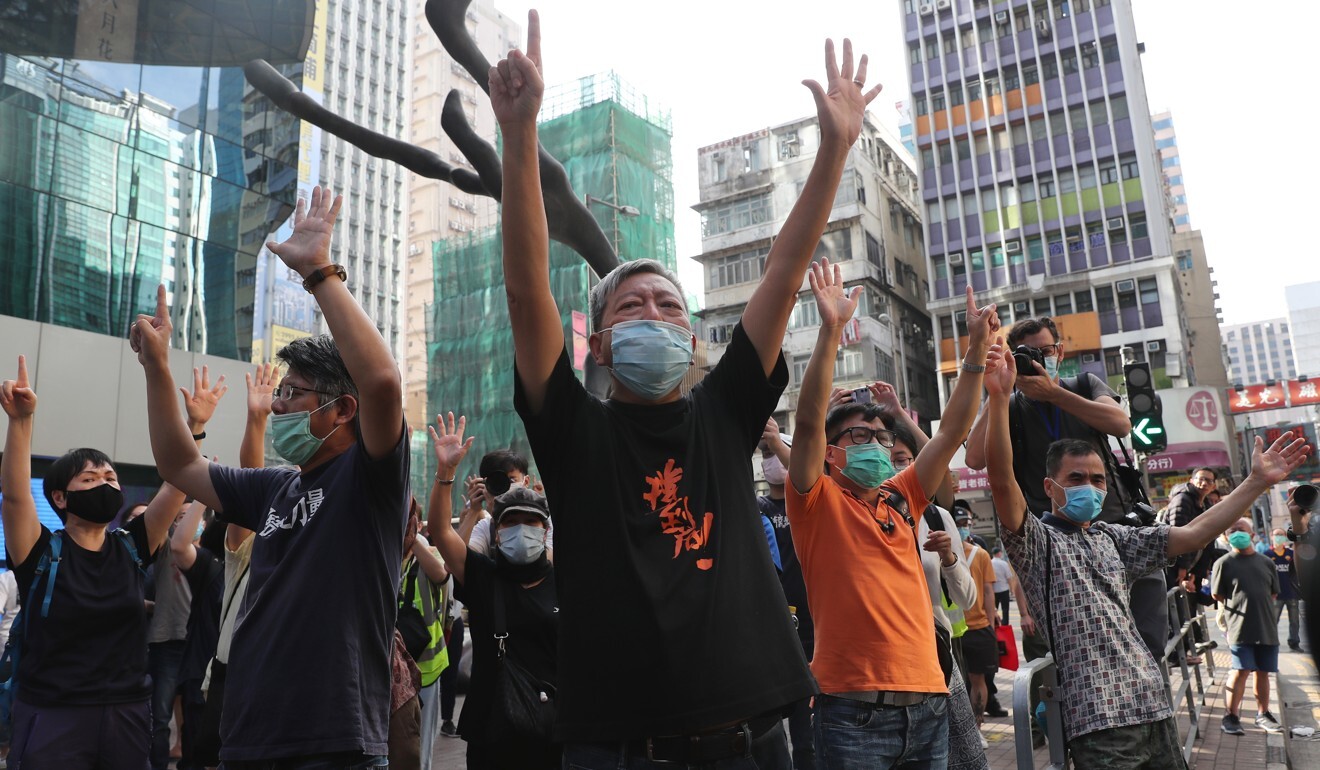
Students Zachery Chan, 16, and Mark Lee, 13, out in Mong Kok with two friends, said they were not afraid of being arrested. “When people are on guard against the pandemic, many don’t come out. So we want to come out,” Mark said.
In Kwun Tong, police officers cordoned off a booth set up by the Construction Site Workers General Union and warned them against gathering in a group of seven.
Among them was youth activist Joshua Wong Chi-fung, who accused police of political suppression. “There was a pro-establishment group’s booth with more than four people, right in front of us, distributing hand sanitiser, but no one ever checked them or gave warnings,” Wong said.
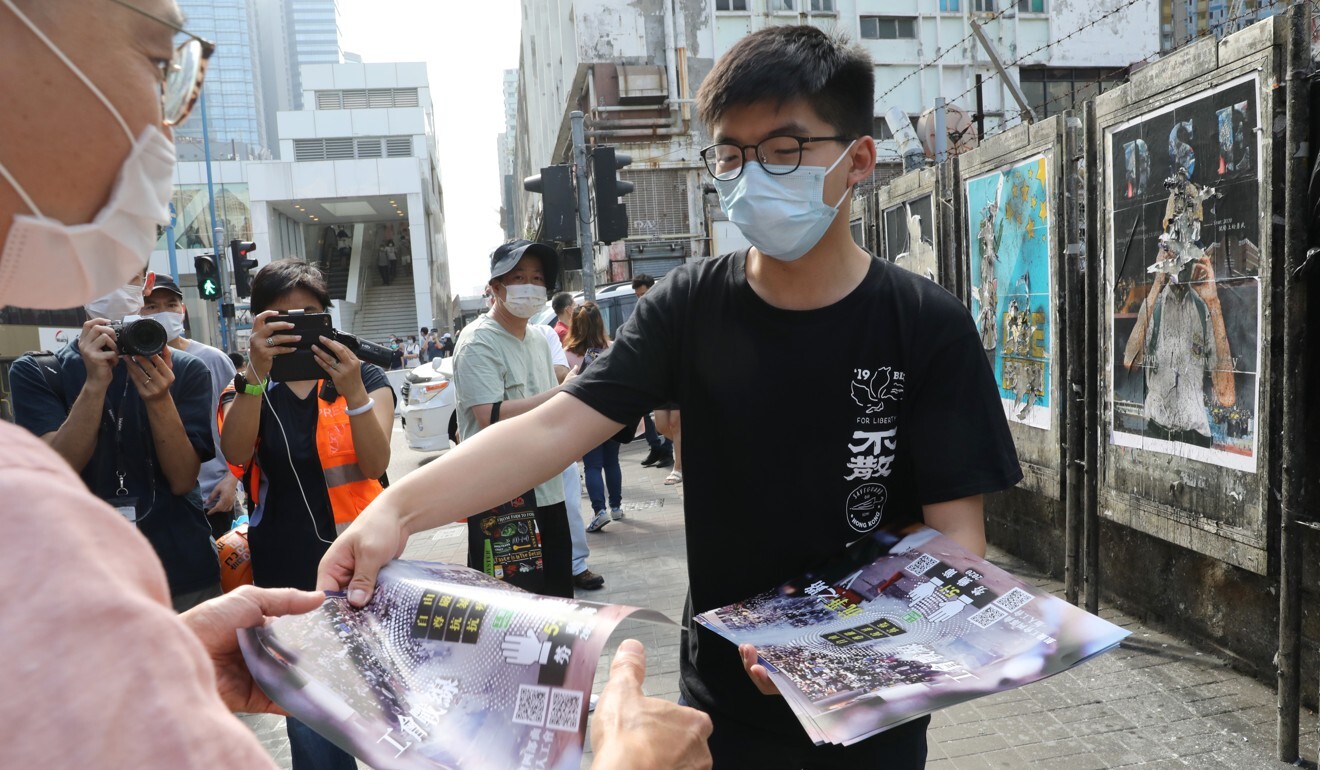
At another booth in Tai Po, Labour Party chairman Kwok Wing-kin called for better worker protection. “Labour rights are needed now more than ever, as employers launch an unprecedented assault on Hong Kong workers during the Covid-19 crisis, with unpaid leave and mass lay-offs,” Kwok said.
In Central, three members of the Hong Kong Hotel Employees Union set up a booth on the footbridge outside the International Finance Centre to recruit members.
Earlier, Labour Party vice-chairman Mak Tak-ching was arrested as he and seven other activists marched from Admiralty Centre to the government’s headquarters to protest against the police force’s refusal to allow the CTU’s May 1 march.
A party spokeswoman said Mak, three other members and four from the League of Social Democrats were marching in two groups of four when police officers stopped them and warned they could be fined for violating social-distancing rules.
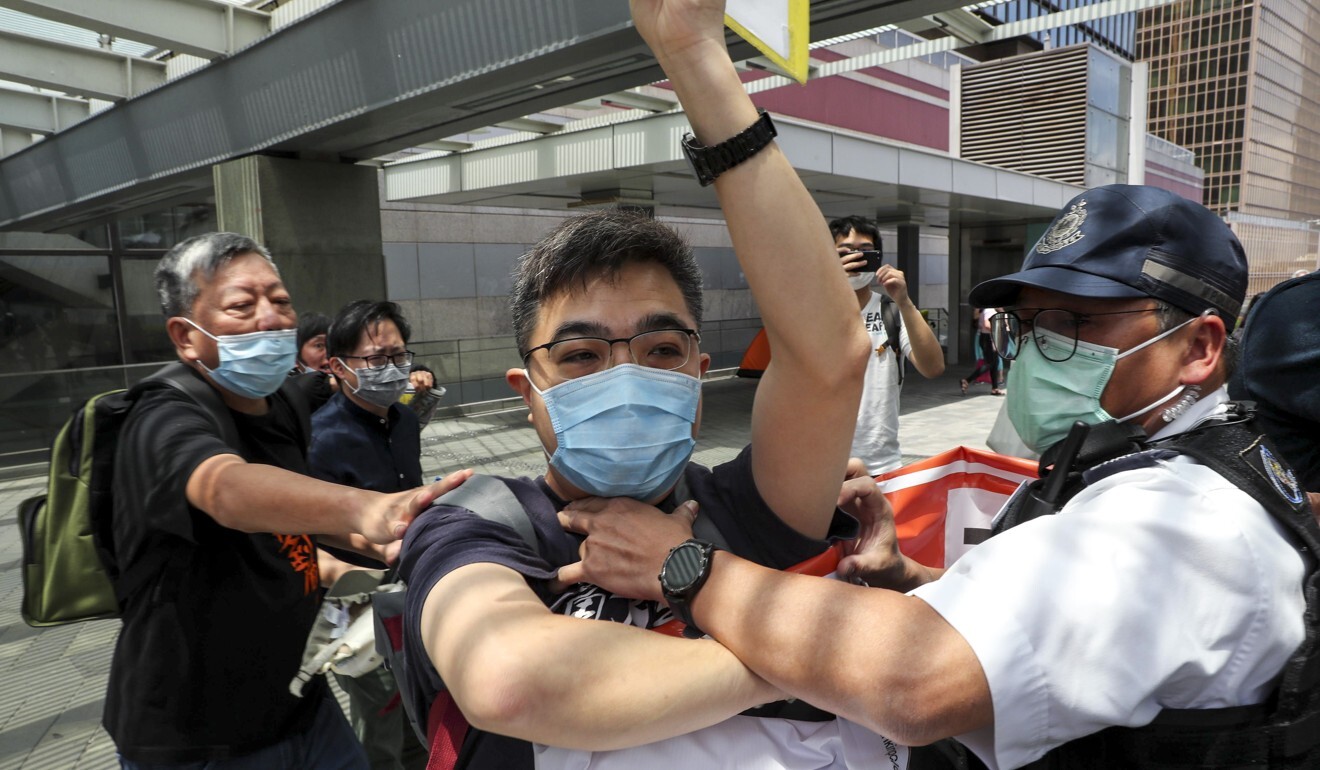
Mak refused to show his identity card when asked and was given a fixed-penalty ticket of HK$2,000 (US$260). He was arrested on suspicion of obstructing officers in the execution of their duties, taken to Central Police Station and later released on bail. The seven others were also ticketed.
Activists have argued they do not violate the ban on crowds as long as a person taking part in a demonstration stays with a group of no more than four.
But police said on Sunday people meeting for a common purpose would be considered a single entity, and therefore fell under the scope of the new law.
Additional reporting by Kinling Lo, Victor Ting, Sarah Zheng and Brian Wong
Help us understand what you are interested in so that we can improve SCMP and provide a better experience for you. We would like to invite you to take this five-minute survey on how you engage with SCMP and the news.